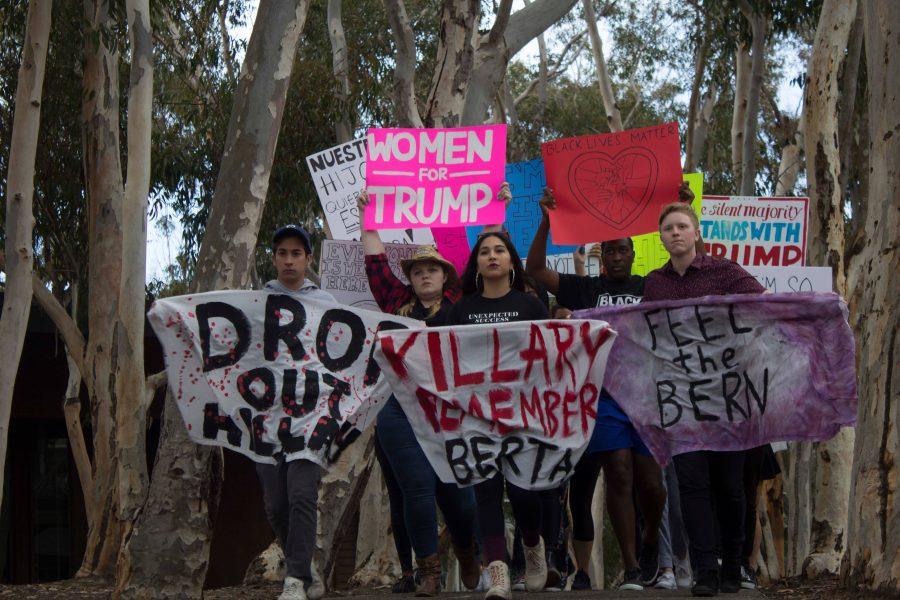Understanding different political perspectives is necessary now more than ever. “Whitelash,” an independent hip-hop musical, analyzes the politics of the 2016 election and the ways in which America can move forward.
The 2016 presidential election is considered to be one of, if not the most, controversial American elections of all time. Contradicting ideologies spurred by the canditures of Hillary Clinton and President Donald Trump further divided America and fueled resentment among people on all sides. With additional drama unfurling around issues such as emails, tax returns, and Russian involvement, the presidential race seemed more like a TV show than a landmark political event. At times, it was hard to believe it was true.
John Muir College senior Johnny Echavarria, a music humanities major and campus-wide senator for the arts and humanities, writes and stars in “Whitelash,” a hip-hop musical about the 2016 presidential election. Set on a college campus, “Whitelash” follows nine students of various backgrounds and opinions as they navigate life during one of the most politically charged eras of all time. The characters are personally impacted by what Echavarria calls “the clashing of ideologies present during the election” and struggle to reconcile their politics with their relationships.
Each character in “Whitelash” is a case study in different perspectives. There’s a Trump supporter who falls in love with an Iranian refugee, a sorority girl obsessed with her political image on social media, a father disagreeing with his son, a Bernie Sanders supporter, a Hillary Supporter, a DACA recipient, a Black Lives Matter activist, and multiple characters with vacillating opinions. But despite the fact that the musical delves deep into each viewpoint, it doesn’t present one side as inherently better than any other. It instead examines the messy nature of political debate and how politics are ultimately present in every human interaction — especially when it comes to a diverse place like a college campus.
Read more:
The Man Behind the Meme: Where Distraction Thrives
From Triple Flips to Toe Loops: UCSD Figure Skating’s Journey to Nationals
Examining Feminism for Women’s History Month
Echavarria chose a college campus as the setting not only because it’s relevant to his target audience’s experience (they experienced the election during their college and early voting years), but also because it’s the perfect place to present dissenting opinion and constructive dialogue. Students come from all over the world to attend UC San Diego and they bring their unique perspectives with them. However, the opinions shared on this campus don’t always necessarily come from UCSD students. Anyone is allowed to physically be at UCSD because it is a public school, and non-students frequently take heed of that. Many of them can be found preaching their opinions (often hate-based) to passerby on Library Walk.
Echavarria was also exposed to the different politics of different places as a canvassing director in Sanders’ presidential campaign. He took a semester off from school to participate and was deeply influenced by the people he met and the stories he heard.
“We went to Oregon, Arizona, Nevada, Washington, different parts of California, and just went into different communities to talk to people,” he recalled. “I got to meet a bunch of different communities and see that there are all these different narratives that go on in these different communities and in these different groups. It got so fascinating to study people — like the sociology of people, the interaction.”
It was because of this interest that he decided to incorporate a experience from the campaign trail into the show.
“I was with a lot of Latino and Black people who felt a very specific way about Hillary Clinton,” he said. “They did not like her. One of the big climaxes of the first act is basically a real event when she came to East LA to give a speech at a community college on Cinco de Mayo. A lot of people there felt that it was pandering. And so there was a protest. There was this whole confrontation between Clinton supporters and Sanders supporters, and there were these random Trump supporters. It was like people colliding and stuff, and it was on the news. I felt it was an interesting and very important narrative that wasn’t really told in mainstream media.”
Of course, the mainstream media plays a direct role in determining which stories are told, often ignoring marginalized perspectives. Echavarria makes sure to include unpopular and underrepresented perspectives. He was partially inspired by Paulo Freire’s political theory book “Pedagogy of the Oppressed,” which argues that oppression can be overcome when marginalized groups gain direct involvement in educating others about their struggle. Echavarria applies this teaching model to the stage in “Whitelash” by having characters of various backgrounds explain the reasons for their personal beliefs, he invites the audience to understand and respect their opinions.
However, the diverse perspectives written into “Whitelash” raise the question of appropriation in writing: If Echavarria doesn’t know what it’s like to be the daughter of Iranian refugees, is it OK for him to write her story without firsthand knowledge of her experience? Would this be perpetuating stereotypes? Who is allowed to tell whose story?
Echavarria was fully aware of his responsibility as a storyteller. Both he and Nicole Lopez, the actress playing the character, conducted extensive research to make sure that the people whose perspectives were being represented were personally involved in the process.
“It’s based off real people that I’ve known and talked to a lot,” he explained. “I’ve actually asked: ‘Is it OK if I use certain things about you in characters?’ and talked to them and interviewed them even more. I felt like they all feel pretty comfortable with the material that’s specific aspects of them. …We talked to people from Iran, because one of the main characters is from Iran. We actually went to Muslim Student Association meetings here at UCSD for when it wanted to reach out to the community. It was really great to talk to people and explain what we were doing. Everyone has been really open to it, from different political and social backgrounds, so it’s been cool.”
This unity and openness to other opinions is the main theme of the show, and the title specifically references this message — although it may seem like otherwise. “Whitelash,” is a term coined by the CNN political commentator Van Jones on the night of the election. Jones described Trump’s election as “a whitelash against a changing country” and as “a whitelash against a black president.” He argued that it was necessary for Trump to apologize to those he had offended and unify the country. In his opinion, everyone needed to come together despite their differences.
“It’s like we’re discussing the deeper values of it and bringing our country together.”
Echavarria’s show, and especially the lyrics, reflect this idea of unity. The characters develop as they learn to empathize with each other, and once the election results are announced, all come together and sing “I love my friends, the ones I met, so let’s not call this the end.”
Even though Echavarria wrote the show almost two years ago, Eleanor Roosevelt College freshman Jolie Andersen, a theater major acting in the musical, believes it is still extremely relevant.
“I think this is actually the best time [for the show] because people have finally settled down out of that very shaky state where we’re just learning that people are Trump supporters and Hillary supporters,” she said. “It’s like we’re discussing the deeper values of it and bringing our country together.”
The cast and crew of “Whitelash” has been working on the production since Week 0 of this year. “Whitelash” struggled to receive departmental support, and it is a completely student-run, independent show funded by its own cast and produced by the student theater organization Company 157. This show is important — it makes the audience think more than they probably do in the classroom — and demonstrates exactly why the arts matter.
Muir College senior Sofia Zaratoga, a theater major and undergraduate representative for the theater department, is directing “Whitelash.” She hopes that viewers can recognize the importance of the 2016 election and understand the significance of living through it. Hopefully, “Whitelash” can inspire important conversations and teach a valuable lesson about unity.
“I really want [the audience] to look at this as a dialogue within the people,” she said. “Because I feel like we do frame people — whether they be Republicans, or Democrats, or Independents — as having very valid opinions and still being humanized and responsible for their actions and their thoughts and being able to justify them as well. I really don’t think that this show ends with the fact that one side is better than the other. For people who still think it’s biased, I’d still love for them to come out and see it and know that the message at the end is that we are all Americans. We might have some problems, but we still all share the same space and should coexist together.”














uops • May 7, 2018 at 8:53 pm
“There’s a Trump supporter who falls in love with an Iranian refugee, a sorority girl obsessed with her political image on social media, a father disagreeing with his son, a Bernie Sanders supporter, a Hillary Supporter, a DACA recipient, a Black Lives Matter activist, and multiple characters with vacillating opinions.”
reminds me of the Pepsi commercial.
no • May 7, 2018 at 10:31 pm
reminds me of the real world.
Dr. Pandy • May 8, 2018 at 8:17 am
The music and lyrics are fantastic. The hip hop songs ought to be played on mainstream radio. This truly amazing play could be taken on the road throughout America and beyond. Absolutely phenomenal.